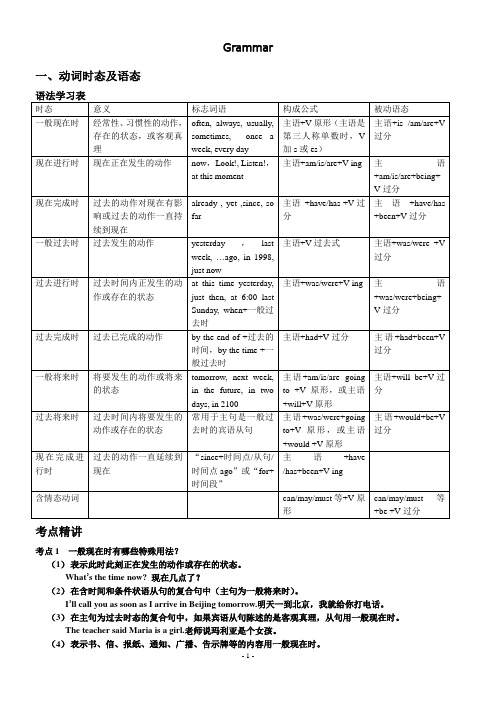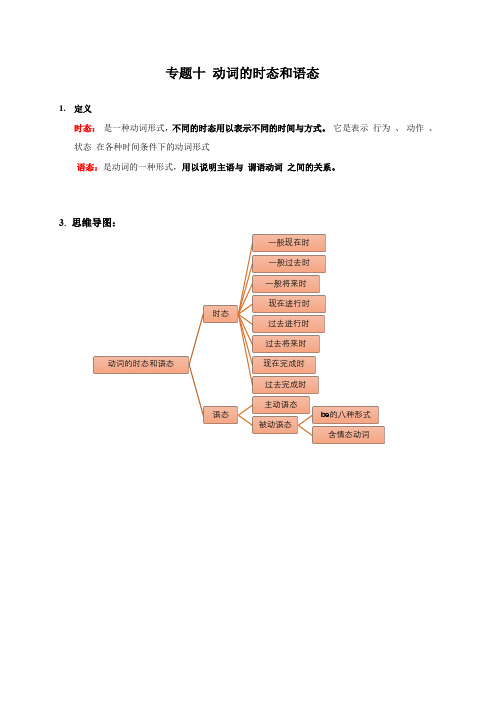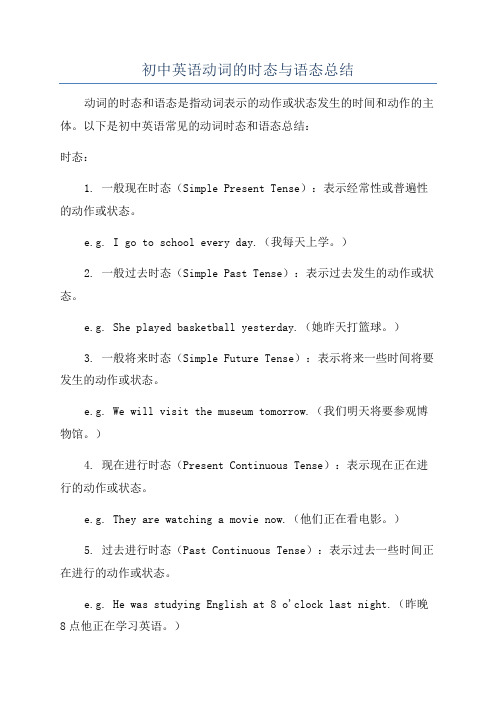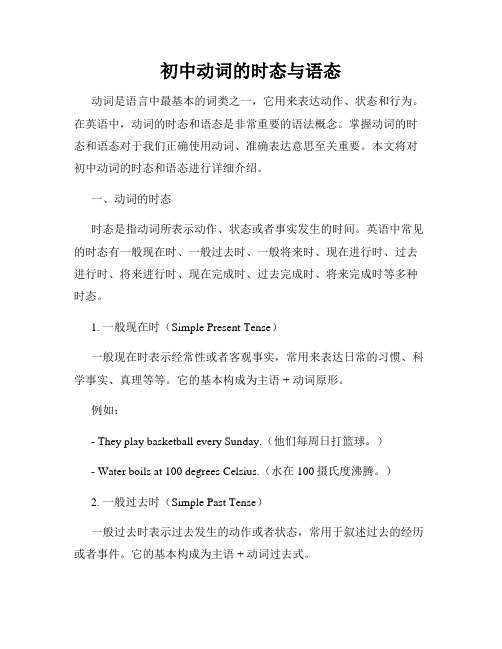初中英语动词的时态与语态总结
初中英语的动词各种时态、语态(80张)

一般现在时的谓语构成: 1、be动词:am/is/are 2、行为动词:
A:动词原形 B:动词+-s在时
am is are are ...
I am ... he/she/it is ... we/you/they
动 单词 数第 变三 化人
称
+s
write – writes
13.The new teachers arrive (arrive) tomorrow. 14.I will have arrived (arrive) by the time the
meeting begins (begin). 15.I will tell (tell) him the news as soon as I
3. If it d_o_e_s_n_’_t_r_a_in_ (not rain) tomorrow, we’ll go to the zoo.
4. Don’t get off the bus until it_st_o(psstop). 5. You may go out to play when you
实战演练
1.Jim usually h_a_s_(have) lunch at home, but sometimes he __h_a_s_ (have) it at school.
2.I’ll tell him the news as soon as he c_o_m__e_s(come) back.
come to our party, my family will be (be)
pleased.
5、表示安排或计划好的将来动作,通 常限于表示"运动"的动词,如:go, come, leave, start等。
初中英语动词时态及语态

Grammar一、动词时态及语态语法学习表时态意义标志词语构成公式被动语态一般现在时经常性、习惯性的动作,存在的状态,或客观真理often, always, usually,sometimes, once aweek, every day主语+V原形(主语是第三人称单数时,V加s或es)主语+is /am/are+V过分现在进行时现在正在发生的动作now,Look!, Listen!,at this moment 主语+am/is/are+V-ing 主语+am/is/are+being+V过分现在完成时过去的动作对现在有影响或过去的动作一直持续到现在already , yet ,since, sofar主语+have/has +V过分主语+have/has+been+V过分一般过去时过去发生的动作yesterday ,lastweek, …ago, in 1998,just now 主语+V过去式主语+was/were +V过分过去进行时过去时间内正发生的动作或存在的状态at this time yesterday,just then, at 6:00 lastSunday, when+一般过去时主语+was/were+V-ing 主语+was/were+being+V过分过去完成时过去已完成的动作by the end of +过去的时间,by the time +一般过去时主语+had+V过分主语+had+been+V过分一般将来时将要发生的动作或将来的状态tomorrow, next week,in the future, in twodays, in 2100主语+am/is/are goingto +V原形,或主语+will+V原形主语+will be+V过分过去将来时过去时间内将要发生的动作或存在的状态常用于主句是一般过去时的宾语从句主语+was/were+goingto+V原形,或主语+would +V原形主语+would+be+V过分现在完成进行时过去的动作一直延续到现在“since+时间点/从句/时间点ago”或“for+时间段”主语+have/has+been+V-ing含情态动词can/may/must等+V原形can/may/must等+be +V过分考点精讲考点1 一般现在时有哪些特殊用法?(1)表示此时此刻正在发生的动作或存在的状态。
初中英语语法专项8动词的时态和语态

【中考考点】
(1)动词的第三人称单数形式、过去式、过去分词和现在分词的构成。 (2)动词的八种时态的基本结构及用法。 (3)动词的被动语态的基本结构及用法。 (4)动词的主动形式表示被动意义的用法。
动词的时态
考点一 一般现在时
1.结构 一般现在时主要用动词原形表示(当主语是第三人称单数时,谓语动词用第三人称单数形式)。 2.动词的第三人称单数形式变化规则 (1)直接加-s。如:work—works (2)以“辅音字母+y”结尾的词,先变y为i,再加-es。如:carry—carries, cry—cries, try—tries, study—studies (3)以s, x, o, ch, sh结尾的词加-es。如: pass—passes, fix—fixes, go—goes, do—does, teach—teaches, wash—washes (4)特殊:have—has, are—is
动词的时态
考点四 过去将来时
1.结构 would+动词原形 was/were+going to+动词原形 2.用法 表示从过去的某一时刻看,将要发生的动作。 His uncle said that there would be a good harvest the next year.他叔叔说第二年会有一个 好收成。 【注意】 在由if引导的条件状语从句中,如果主句用过去将来时,那么if从句需用一般过去时代替过 去将来时。 If he were here, he would show us how to do it. 如果他在这儿,他就会向我们展示该如何做。
动词的时态
4.动词过去式的变化规则 (1)一般情况下,在动词原形后加-ed。如: watch—watched (2)以不发音的字母e结尾的加-d。如:live—lived (3)以“辅音字母+y”结尾的,变y为i,再加-ed。如: study—studied, carry—carried, cry—cried (4)以重读闭音节结尾,且末尾只有一个辅音字母的,先双写该辅音字母,再加-ed。如: stop—stopped, plan—planned, prefer—preferred (5)不规则动词的过去式需特殊记忆。
动词时态和语态总结

四、现在进行时 1.表示说话时正在进行而尚未完成的动作或状态。
We are having an English lesson. 2.表示现阶段一直在进行的动作,但说话时不一定正在进行。
The workers are building a new factory.
3.有时可表示即将发生的动作〔只限于go, come, stay, leave, start, begin, arrive, return, fly, drive等动词〕这时常有一个
played table tennis almost everyday. 4〕在条件、时间状语从句中表示过去将来的动作。
They said they wo精u品lPdPTlet us know if they heard any news about him.
三. 一般将来时 一般将来时表示将来要发生的动作和存
精品PPT
二、一般过去时 1〕表达特定的过去时间内发生的动作或存在的状况,
常与last week/year/ month/ spring, a few days ago, in 1998等时间状语以及when等连词引
导的时间状语从句连用。
We had a good swim last Sunday.
3〕用在问句中,表示委婉礼貌; Will you be reading anything else? When shall we be meeting again?
When I was young, I took cold baths regularly. 2〕表达过去连续发生的一件件事。
He got up early in the morning, fetched water,
初中英语人教版 中考 语法专题 10 动词的时态和语态

专题十动词的时态和语态1.定义时态:是一种动词形式,不同的时态用以表示不同的时间与方式。
它是表示行为、动作、状态在各种时间条件下的动词形式语态:是动词的一种形式,用以说明主语与谓语动词之间的关系。
3. 思维导图:动词的时态和语态时态一般现在时一般过去时一般将来时现在进行时过去进行时过去将来时现在完成时过去完成时语态主动语态被动语态be 的八种形式含情态动词1.动词的时态1.常考的时态构成及用法a.一般现在时d.现在进行时e.过去进行时f.过去将来时g.现在完成时h.过去完成时2. 动词的语态a. 分类:主动语态:表示主语是动作的执行者被动语态:表示并语是动作的执行者c.主动语态和被动语态的转换规则典型例题总分:50分姓名:得分:1.单选题(每小题1分,共50分)( ) 1. Jenny, together with the Greens the White Tower Park if it tomorrow.A.are going to; isn't rainyB.is going to; doesn't rainC.are going to; won't rainD.is going to; isn't rain( ) 2. The old man for quite some time.A.has diedB.dieC.has deadD.has been dead( ) 3. It is reported that a tall building in the city next year.A.will be builtB.were buildC.have builtD.will build( ) 4. My sister for 2 years.A.has marriedB.have got marriedC.has been marriedD.married( ) 5. Chinese ________in many schools around the world and many people love to learn it.A.teachesB.is teachingC.has taughtD.is taught( ) 6. When Tom was in primary school, he ________the piano every day.A.playsB.playedC.was playingD.has played( ) 7. A baby's first month birthday is a special event in China and _____with a special Party.A.celebratesB.is celebratedC.was celebratedD.will celebrate( ) 8. -Were you at home at 9 o'clock last night?-Yes, I a shower at that time.A.tookB.was takingC.was takenD.am taking( ) 9. National Day celebrations for China's seventieth birthday in about three months.A.will be heldB.will holdC.is heldD.was held( ) 10. We don't know if he tomorrow. If he, I will call youA.will come, will comeB.will come, comeses, will comees, comes( ) 11. He told me that he ______ his uncle in Thailand the next day.A.will visitB.has visitedC.is going to visitD.would visit( ) 12. -Tom, do you know ________? -In Beijing.A.where will the 24th Winter Olympics be heldB.where the 24th Winter Olympics will holdC.where the 24th Winter Olympics will be heldD.where will the 24th Winter Olympics hold( ) 13. Peter with his classmates ________ for the bus when the earthquake happened.A.is waitingB.was waitingC.are waitingD.were waiting( ) 14. his museum ________ here for over 80 years. It ________ one of the oldest buildings in this city.A.is; wasB.had been; isC.was; has beenD.has been; is( ) 15. -Mrs. Brown, how long can books from the school library ?-At most two weeks.A.borrowB.keepC.be borrowedD.be kept( ) 16.-An AI robot _____in our school dining hall next term.-I'm looking forward to it.A.will useB.will be usedC.is usedD.was used( ) 17. Usually a baby's face ____ smooth.A.is feelingB.feltC.feels likeD.feels( ) 18. She _____ an English magazine when I came in.A.readsB.has readC.will readD.was reading( ) 19. I will call you as soon as he______ here.A.arriveB.will arriveC.arrivesD.arrived( ) 20. Boys and girl, ______ learning and have fun!A.keepB.to keepC.keepingD.kept( ) 21. There ______a basketball game between these two grades in the gym this afternoon.A.willB.is going to haveC.is going to beD.will have( ) 22. We ______TV from seven to nine last night.A.were watchingB.will watchC.watchedD.watch( ) 23. Jack's mother taught me how ________ Yunnan rice noodles last weekend.A.to makeB.makingC.makeD.to making( ) 24. Mrs. Green said the plates ________ right away,or they would become difficult to wash.A.will be washedB.should washC.will washD.should be washed( ) 25. The documentary Under the Dome (《苍穹之下》)which ________ by Chai Jing showed us that the air pollution in China was very serious.A.producesB.producedC.is producedD.was produced( ) 26. -What did you do last night?- I ________ my homework and watched TV.A.didB.doC.am doingD.will do( ) 27.The hospital is very famous. It _______ in 2001.A.buildsB.builtC.was builtD.is built( ) 28.These rules are made the disabled.A.protectB.protectedC.to protectD.protecting( ) 29. -How much does the TV ?-Not too much. It's just a second-handed one.A.costB.spendC.takeD.pay for( ) 30. -Have you ever ________ an amusement park?- Yes, I have ________ Fun Times Amusement Park last year.A.been to, have gone toB.gone to, have been toC.go to, went toD.been to, went to( ) 31.We are glad to hear that the terrorists ________ by the brave policemen several days ago.A.are caughtB.were caughtC.have been caughtD.are going to be caught ( ) 32. -Why didn't you go to the party last night? - Because I _____.A.wasn't invitedB.didn't invitedC.haven't invitedD.don't invited ( ) 33. -What _____ you supposed ____ when you are in China?- You should shake hands.A.are, to doB.do, to doC.are, doingD.have, to do( ) 34. So far, we ________ English for three years.A.have learntB.learnC.learntD.had learnt( ) 35.The boy was made ______ the words again and again.A.copyB.copyingC.copiesD.to copy( ) 36. The sports meeting in our school now.A.being heldB.is havingC.is holdingD.is being held( ) 37. The window ____ ten minutes ago, and the room is bright now.A.can be cleanedB.is cleanedC.was cleanedD.will be cleaned( ) 38. -Oh, Mrs. King, your necklace looks nice. Is it new?-No, I _______ it for 2 years.A.hadB.have hadC.boughtD.have bought( ) 39. He has ordered a watch on line for his father and it _______ to him before Father's Day.A.sendB.will be sentC.was sentD.sent( ) 40. There ______ a funny cartoon on CCTV 6 this evening.A.willB.will haveC.is going to beD.is going to have( ) 41. -________ did your uncle leave his home town? -He ___________ for nearly twenty years.A.When, has leftB.When, has been awayC.How long, has leftD.How long, has been away ( ) 42. My uncle ________ Germany on business many times.A.has been onB.has gone toC.has been toD.has been in( ) 43. Her life ________ a lot during the last three years.A.changedB.changingC.has changedD.will change( ) 44. -Lisa was seen ______ an old man go across the street this morning. -What a kind girl she is!A.helpingB.helpedC.to helpD.helps( ) 45. My computer has broken down. I'll get it _______ this afternoon.A.repairsB.repairedC.to repairD.repairing。
初中英语知识点归纳动词的不同时态与语态

初中英语知识点归纳动词的不同时态与语态动词的不同时态与语态是初中英语的重要知识点。
掌握了动词的时态和语态,我们就能更准确地表达过去、现在和将来的动作,以及主语对动作的不同态度。
下面是对初中英语中动词的不同时态与语态的归纳总结。
一、动词的时态1. 一般现在时一般现在时表示经常性或习惯性的动作、客观真理、固定事件等。
例句:- I go to school every day.(我每天去上学。
)- The sun rises in the east.(太阳从东方升起。
)2. 现在进行时现在进行时表示现在正在进行的动作。
例句:- He is watching TV now.(他正在看电视。
)- They are playing basketball in the park.(他们正在公园里打篮球。
)3. 一般过去时一般过去时表示过去发生的动作或存在的状态。
例句:- We watched a movie last night.(昨晚我们看了一场电影。
)- She lived in Beijing when she was young.(她年轻时住在北京。
)4. 过去进行时过去进行时表示过去某个时间正在进行的动作。
例句:- They were having dinner at 7 o'clock yesterday.(昨天7点他们正在吃晚饭。
)- At this time last year, I was studying in London.(去年这个时间,我正在伦敦学习。
)5. 将来时将来时表示将要发生的动作或存在的状态。
例句:- We will go to the beach next week.(下周我们将去海滩。
)- She is going to visit her grandparents tomorrow.(她明天将要去看望她的祖父母。
)二、动词的语态1. 主动语态主动语态表示主语是动作的执行者。
初中英语动词的时态与语态总结

初中英语动词的时态与语态总结动词的时态和语态是指动词表示的动作或状态发生的时间和动作的主体。
以下是初中英语常见的动词时态和语态总结:时态:1. 一般现在时态(Simple Present Tense):表示经常性或普遍性的动作或状态。
e.g. I go to school every day.(我每天上学。
)2. 一般过去时态(Simple Past Tense):表示过去发生的动作或状态。
e.g. She played basketball yesterday.(她昨天打篮球。
)3. 一般将来时态(Simple Future Tense):表示将来一些时间将要发生的动作或状态。
e.g. We will visit the museum tomorrow.(我们明天将要参观博物馆。
)4. 现在进行时态(Present Continuous Tense):表示现在正在进行的动作或状态。
e.g. They are watching a movie now.(他们正在看电影。
)5. 过去进行时态(Past Continuous Tense):表示过去一些时间正在进行的动作或状态。
e.g. He was studying English at 8 o'clock last night.(昨晚8点他正在学习英语。
)6. 将来进行时态(Future Continuous Tense):表示将来一些时间正在进行的动作或状态。
e.g. They will be playing soccer at 4 pm tomorrow.(他们明天下午4点将正在踢足球。
)7. 现在完成时态(Present Perfect Tense):表示过去一些时间开始的动作一直持续到现在,或者与现在有关系的过去动作或状态。
e.g. I have lived in this city for 10 years.(我在这个城市住了10年了。
初中动词的时态与语态

初中动词的时态与语态动词是语言中最基本的词类之一,它用来表达动作、状态和行为。
在英语中,动词的时态和语态是非常重要的语法概念。
掌握动词的时态和语态对于我们正确使用动词、准确表达意思至关重要。
本文将对初中动词的时态和语态进行详细介绍。
一、动词的时态时态是指动词所表示动作、状态或者事实发生的时间。
英语中常见的时态有一般现在时、一般过去时、一般将来时、现在进行时、过去进行时、将来进行时、现在完成时、过去完成时、将来完成时等多种时态。
1. 一般现在时(Simple Present Tense)一般现在时表示经常性或者客观事实,常用来表达日常的习惯、科学事实、真理等等。
它的基本构成为主语 + 动词原形。
例如:- They play basketball every Sunday.(他们每周日打篮球。
)- Water boils at 100 degrees Celsius.(水在100摄氏度沸腾。
)2. 一般过去时(Simple Past Tense)一般过去时表示过去发生的动作或者状态,常用于叙述过去的经历或者事件。
它的基本构成为主语 + 动词过去式。
例如:- I visited my grandparents last weekend.(我上个周末去看望了我的祖父母。
)- She didn't go to school yesterday.(她昨天没有去上学。
)3. 一般将来时(Simple Future Tense)一般将来时表示将来要发生的动作或者状态,常用于表达计划、打算、预测等等。
它的基本构成为主语 + will + 动词原形。
例如:- We will have a party next Friday.(我们下周五要举办一个聚会。
)- She won't come to the meeting tomorrow.(她明天不会来参加会议。
)4. 现在进行时(Present Continuous Tense)现在进行时表示正在进行的动作,通常用于描述当前正在发生的事情。
- 1、下载文档前请自行甄别文档内容的完整性,平台不提供额外的编辑、内容补充、找答案等附加服务。
- 2、"仅部分预览"的文档,不可在线预览部分如存在完整性等问题,可反馈申请退款(可完整预览的文档不适用该条件!)。
- 3、如文档侵犯您的权益,请联系客服反馈,我们会尽快为您处理(人工客服工作时间:9:00-18:30)。
新目标初中英语总复习资料精品讲义(二)动词的时态与语态的综合运用确定正确的时态1.根据时间状语确定时态.时间状语与时态有着密切的关系.①. I ____ ____ (write) now. ②. I ____ __(lose) my pen yesterday.③. We ______ _____ (study) English for two years.2.根据上下文来确定时态有些句子没有明显的时间状语,又不能用时态呼应规则来对照,这时就可以根据上下文内容来判断时间关系,确定正确时态.A: Where are the twins? B: They ______ (go) to visit Uncle Wang.3.根据主从句的关系来确定时态.4.根据语言习惯来确定时态*come,go,leave 等趋向性动词的进行时可用来表示即将发生的动作.*永恒的真理和客观存在的状态用一般现在时.*祈使句中,或在情态动词,助动词后,谓语动词用原形Don't (read) in the sun, will you?You'd better (stay) at home since it's raining outside.注意所填动词的语态:Today both basketball and volleyball __ _______(play) in many countries.确定动词的形式:1. be busy, what/how about 等后用动词的-ing 形式.2.在介词后一般应用动词的-ing 形式.3.在keep, enjoy, finish, mind 等动词后采用动词的--ing 形式.4.在动词decide, hope, wish, hate 等动词后应用动词不定式作宾语,而在ask, tell, want, teach 之后则用动词不定式的复合结构,即“ask sb. to do sth.”的形式5.在see, hear, watch, make, let 等后面作宾语补足语的动词不定式应省略动词不定式符号“to”,但在被动句中, 应添上"to".6.在It’s time(for sb.)to do sth. 和It's kind/nice/good of sb. to do sth. 和It takes sb. some time to do sth. 的句型中, 动词不定式短语作句子真正的主语.7.疑问代词/副词(why 除外) + to do sth. 结构,可在句中作主语, 表语和宾语.练习题:1. The Great Green Wall will stop the wind from ________(blow) the earth away.2. Mr. Smith kept on (ask) the players to remember-----TEAMWORK3. Alice didn't hear what the teacher said just now, so she doesn't know how ____ (do) the problem.4. The policeman asked the old granny to put down her heavy box and let him ______ (carry) it for her.5.用help, happen, listen, have, ask, be, plant, miss, leave, look 的适当形式填空:(1).Wang Hai is a good comrade. He always does his best ________others.(2).Dig the hole big enough, or the trees can’t ___________well .(3).It's time for class. Let's stop _______to the teacher.(4).Her face turned red when she _______ to sing a song for all of us.(5).She is older than Mary but ________much younger.(6).--I can't find my keys.--Maybe you ___________ them at home.(7).We waited in the next room while they ____________a meeting.(8).Hurry up. You __________the train if you don't.思考题:用send, show, turn, cost, write, fly, get, stop, see, do, hear, go 的适当形式填空1.___ _ you _ __ each other since you left school ten years ago?2. What __ _they _ __at 8:00 yesterday evening.3. The Smiths are getting ready to Australia for their holiday.4 .The beautiful jacket too much, doesn't it?5 .Lucy and Lily were playing cards when they __ _ a loud knock at the door.6. The radio says the rain _ __later on.7. The boy __ _to hospital as soon as the traffic accident happened.8. Today films__ _in English everywhere in the world.9. It's summer now. The days__ _longer and the nights shorter.10. Mother _ __ to Shanghai and she'll be back in a week or so.动词的时态(上)A:一般现在时:①表示现在的状态,如:He is twelve. / She is at home.②表示经常的或习惯性的动作,如:I go to school at 7:30 every day.③表示主语具备的性格和能力等,如:She likes apples. / They know English.结构:1)be 动词:第一人称单数为am,第三人称单数为is,其他人称为are。
肯定式: 主语+ am /is/are +其他否定式:主语+ am/is/are +not + 其他疑问式:Am /Is /Are + 主语+ 其他?简略回答: (肯) Yes,主语+ am/ is /are (否) No,主语+ am /is/are not.缩写形式: I'm = I am That's =That is We're =We are What's= What is You're = You are Who's = Who is They're =They are Where's =Where is He's =He isisn't=is not She's =She is aren't=are not It's == It is2)行为动词:除主语是第三人称单数外,都用动词原形,主语是第三人称单数时,在动词词尾加-s 或-es (变化规则与名词变复数时相同,注意:have 的第三人称单数为has)。
肯定式:主语+动词原形/动词的第三人称单数否定式:主语+助动词don't/doesn't +动词原形+其他疑问式:Do/Does+主语+动词原形+其他简略回答:(肯)Yes,主语+do/does. (否)No,主语+don’t/doesn’t.缩写形式:don't == do not doesn't ==does not用法:1.表示事实,现状,性质或经常的,习惯的动作,常与often, usually, always, sometimes, today, every day/morning, once a week, every five minutes, on Sundays 等时间状语连用。
2.表示普遍真理、客观存在、科学事实。
如.:The earth moves around the sun. 地球绕着太阳转。
/ The earth is round.地球是圆的。
Shanghai lies in the east of China. 上海位于中国东部。
注意:此用法如果出现在宾语从句中,即使主句是过去时,从句谓语也要用一般现在时。
如:Columbus proved that the earth is round.3.表示在现在时间里所发生的一个动作. eg. Here comes the train.4.在时间和条件状语从句中代表一般将来时. eg. I'll go with you if you are free tomorrow. B:一般过去时:一般过去时表示过去某个时间发生的动作或存在的状态,常和表示过去的时间状语连用,如yesterday, last night/week/year, in 1990, when I was five years old, two days ago等。
一般过去时也可表示过去经常或反复发生的动作,常和always, often等表示频度的时间状语连用。
如:I got up at 6:30 yesterday. He always went to work by bus last year.结构:1)be动词:第一、三有称单数用was,其他人称用were,其肯定式,否定式,疑问式和简略回答形式与一般现在时相似。
2)行为动词:行为动词的过去式分为规则和不规则两种, 规则动词的过去式是在动词后加ed或d,不规则动词参照不规则动词表,需要专门记忆。
